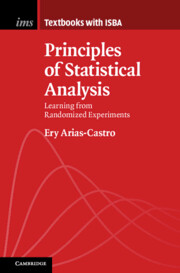Book contents
- Frontmatter
- Dedication
- Frontmatter
- Contents
- Preface
- Acknowledgements
- Part I Elements of Probability Theory
- Part II Practical Considerations
- Part III Elements of Statistical Inference
- 12 Models, Estimators, and Tests
- 13 Properties of Estimators and Tests
- 14 One Proportion
- 15 Multiple Proportions
- 16 One Numerical Sample
- 17 Multiple Numerical Samples
- 18 Multiple Paired Numerical Samples
- 19 Correlation Analysis
- 20 Multiple Testing
- 21 Regression Analysis
- 22 Foundational Issues
- References
- Index
14 - One Proportion
from Part III - Elements of Statistical Inference
Published online by Cambridge University Press: 22 July 2022
- Frontmatter
- Dedication
- Frontmatter
- Contents
- Preface
- Acknowledgements
- Part I Elements of Probability Theory
- Part II Practical Considerations
- Part III Elements of Statistical Inference
- 12 Models, Estimators, and Tests
- 13 Properties of Estimators and Tests
- 14 One Proportion
- 15 Multiple Proportions
- 16 One Numerical Sample
- 17 Multiple Numerical Samples
- 18 Multiple Paired Numerical Samples
- 19 Correlation Analysis
- 20 Multiple Testing
- 21 Regression Analysis
- 22 Foundational Issues
- References
- Index
Summary
Estimating a proportion is one of the most basic problems in statistics. Although basic, it arises in a number of important real-life situations. Examples include election polls, conducted to estimate the proportion of people that will vote for a particular candidate; quality control, where the proportion of defective items manufactured at a particular plant or assembly line needs to be monitored, and one may resort to statistical inference to avoid having to check every single item; and clinical trials, which are conducted in part to estimate the proportion of people that would benefit (or suffer serious side effects) from receiving a particular treatment. The fundamental model is that of Bernoulli trials. The binomial family of distributions plays a central role. Also discussed are sequential designs, which lead to negative binomial distributions.
- Type
- Chapter
- Information
- Principles of Statistical AnalysisLearning from Randomized Experiments, pp. 192 - 202Publisher: Cambridge University PressPrint publication year: 2022

